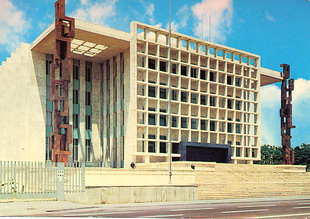
Ali Hosseini Khamenei is an Iranian cleric and politician who has served as the second supreme leader of Iran since 1989. He previously served as the third president of Iran from 1981 to 1989. Khamenei's 35-year-long rule has made him the longest-serving head of state in the Middle East, as well as the second-longest-serving Iranian leader of the last century after Shah Mohammad Reza Pahlavi. Khamenei is a Grand Ayatollah and marja, and is considered the leader of Shia Muslims and the Axis of Resistance.

Akbar Hashemi Bahramani Rafsanjani was an Iranian politician and writer who served as the fourth president of Iran from 1989 to 1997. One of the founding fathers of the Islamic Republic, Rafsanjani was the head of the Assembly of Experts from 2007 until 2011 when he decided not to nominate himself for the post. He was also the chairman of the Expediency Discernment Council.

The Assembly of Experts, also translated as the Assembly of Experts of the Leadership or as the Council of Experts, is the deliberative body empowered to appoint the Supreme Leader of Iran. All directly elected members must first be vetted by the Guardian Council.

Mohammad Yazdi was an Iranian conservative and principlist cleric who served as the head of Judiciary System of Iran between 1989 and 1999. In 2015, he was elected to lead Iran's Assembly of Experts, defeating Akbar Hashemi Rafsanjani, a former president, by a vote count of 47 to 24.

Muhammad Taqi Misbah YazdiGiwachi was an Iranian Shia scholar, political theorist and philosopher who served as the spiritual leader of the Front of Islamic Revolution Stability.

The Combatant Clergy Association is a politically active group in Iran, but not a political party in the traditional sense.

The fourth Iranian Assembly of Experts election was held on 15 December 2006. The Assembly of Experts is a Council of 86 mujtahids that elect the Supreme Leader, and oversee his actions. The members of the Assembly are elected every eight years directly by the people of Iran.

The Assembly for the Final Review of the Constitution, also known as the Assembly of Experts for Constitution, was a constituent assembly in Iran that was convened in 1979 to condense and ratify the draft prepared beforehand for the Constitution of the Islamic Republic of Iran.

The supreme leader of Iran, also referred to as the supreme leader of the Islamic Revolution, but officially called the supreme leadership authority, is the head of state and the highest political and religious authority of Iran. The armed forces, judiciary, state radio and television, and other key government organizations such as the Guardian Council and Expediency Discernment Council are subject to the Supreme Leader. According to the constitution, the Supreme Leader delineates the general policies of the Islamic Republic, supervising the legislature, the judiciary, and the executive branches. The current lifetime officeholder, Seyyed Ali Hosseini Khameneh known as Ali Khamenei, has issued decrees and made the final decisions on the economy, the environment, foreign policy, education, national planning, and other aspects of governance in Iran. Khamenei also makes the final decisions on the amount of transparency in elections, and has dismissed and reinstated presidential cabinet appointees.
The fifth Iranian Assembly of Experts election were held in Iran on 26 February 2016 to elect the members of the Assembly of Experts. All 88 members of the Assembly of Experts, who are known as mujtahids, are directly elected. The elections had been planned for 2014, but were delayed in order for the election to be held alongside the Islamic Consultative Assembly elections.

The third Iranian Assembly of Experts election was held on October 23, 1998 to elect all 86 members in 28 constituencies. 17,857,869 citizens voted in the elections, marking a 46.3% turnout.

An election for the third Supreme Leader of Iran is scheduled to be held following the end of the current tenure of Ali Khamenei. As of January 2025, no person has been officially declared as the heir to the current leader nor as a nominee, though various sources such as Reuters and the BBC have written on potential candidates.

Sheikh Zaynolabideen Ghorbani Persian: شیخ زینالعابدین قربانی, is an Iranian Ayatollah. He represented the Supreme Leader of Iran for Gilan Province, as well as leading prayers in Lahijan and Rasht. He represented the people in Gilan for both the Assembly of Experts, and Islamic Consultative Assembly.

Sheikh Abbas Ali Akhtari was an Iranian Ayatollah. He represented the Supreme Leader of Iran in Semnan province, while also serving as the Imam of Friday Prayer in Semnan. He also represented the people in Khorasan province in the early 80's for the first term of the Islamic Consultative Assembly. He later represented the people of Tehran province for the seventh term of the Iranian Parliament. He was a member of Assembly of Experts, from February 2021 to October 2022 in the fifth term of the Assembly of Experts, after the death of Nasrallah Shah-Abadi. He was elected in the first midterm elections of the Assembly of Experts on 23 February 2020.

Seyed Mohammad Shahcheraghi Persian: سید محمد شاهچراغی, is an Iranian Ayatollah. He represented the Supreme Leader of Iran in Semnan province, as well being the Imam of Friday Prayer in Semnan. He was elected by the people of Semnan province to represent them in the Assembly of Experts for two terms. He was a member of Assembly of Experts until May 2024.











